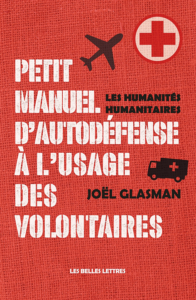
Publishers Gallimard have just released this book, with all profits going to the maritime-humanitarian organisation SOS Méditerranée. A collection of essays by authors who wanted to unite their voices to make heard the very faint, when not silenced, voice of migrants. Our thanks go to Jean-Marie Laclavetine for his hard-hitting yet thoughtful foreword to the collection we have the pleasure to publish in our columns.
Boris Martin, Editor-in-Chief
The Ocean Viking was patrolling the international waters off the coast of Libya on the night of 20-21 April 2021, when Alarm Phone, a hotline that receives calls from migrants in distress, reported a vessel lost in a raging sea battered by waves of over 6m. The migrants had been making fruitless distress calls for two days, passed on by Alarm Phone to the Italian, Maltese and Libyan maritime authorities, who were bickering over who was responsible for the rescue in a macabre game of ping-pong. The SOS Méditerranée rescue vessel set off on a race against time to find the small boat before it capsized. The rescue boat spent the day looking for the small boat, helped by three merchant cargo ships, obeying the unbreakable law of the sea, which says that ships must go to rescue anyone in distress and bring them to a safe place – a fundamental law that Europe’s leaders flout on a daily basis on our behalf. It was too late when the rescue team finally made it to the spot: dozens of bodies were floating on the surface. Even today, the memory of those 130 deaths continues to haunt the rescuers. These men, women (one of whom was pregnant) and children would never reach the safe haven that should have welcomed them and would never see the safety of the coastline come into view on the horizon, and we will never know their names. On the very same day, two other small boats were reported missing to the east of this area. One was intercepted by the Libyans, and the other sank with forty-two passengers on board.
The Ocean Viking crew are seeing the results of this organised policy of abandonment every day at sea. Every day? Not really, as the rescue ship is sometimes held up in port, its work hindered by the authorities. Indeed, cynicism sometimes takes the form of harassment with a single end goal: preventing migrants from setting foot on European soil.
Let’s say things as they are: European migration policy is quite simply racist. At a time when we are opening our doors, and rightly so, to Ukrainian refugees, we remain intransigent with non-whites, and outsource to neighbouring countries the job of pushing back the pitiful hordes from the Global South. As it happens, Ukraine is one of these “border guard” countries. The European Union has paid the country tens of millions of euros to build seven migrant detention centres. At the start of summer 2022, hundreds of terrified Afghans, Iraqis, Syrians, Cameroonians, Ghanaians, Guineans and Ethiopians were packed into these detention centres, trapped in areas affected by fighting and air raids, and nothing was being done to extricate them: the European Temporary Protection Directive (TPD) implemented in early March does not apply to them. Ukraine, just like Slovakia, Hungary and other countries, have become Fortress Europe’s border guards, with Europe funding them based on the very vague promise of future integration, so that they unceremoniously push back migrants or detain them while ignoring their claims for asylum. It is worth noting that the animals in Ukraine’s zoos have been more fortunate: the lions, giraffes and chimpanzees have found refuge in neighbouring countries, without anyone asking them for ID documents.
And among these prison guard countries, Libya naturally plays a leading role. The makeshift craft are frequently intercepted at sea and disembarked in detention centres in which rape, forced labour, ransoms, torture, kidnapping and physical abuse are daily occurrences. We are making a generous contribution to funding these detention centres. The people smugglers call the shots in the detention centres. They firstly extort the migrants, then force hundreds of them every day to board barely seaworthy vessels unsuitable for the crossing to Italy.
For a long time, we regarded with horror the “Wall of Shame” in Berlin, separating Good (i.e., us, the happy inhabitants of the liberal paradise) from totalitarian Evil. The Berlin Wall remains a repugnant symbol, yet we forget that fewer than 100 people died trying to cross it, whereas nowadays, before our very eyes, another wall is proving to be a thousand times more deadly. That wall is called the Mediterranean. We are willing to sacrifice thousands of undesirable innocents to protect our wellbeing and safeguard our unequal and decadent regimes, while remaining convinced that we are much better than the Stalinists of yesteryear or today, a lot better than the Turkish and Libyan guard dogs to whom we outsource the task of pushing back, in unspeakable conditions, those seeking to reach the paradise of Europe. All this in the name of reason, common sense, preserving our culture, heritage, ever-so fragile economies and the carefully nurtured spectre of the great replacement theory. The rescue work done by SOS Méditerranée since 2015 rejects this policy based on fanatical selfishness. The equation is simple: human beings are in danger of drowning at sea and regardless of the reasons for their journey, irrespective of the difficulties (practical or electoral) that their arrival in Europe may create, we have the duty to rescue them. The time-honoured law of the sea and international legislation, formally recognised by most countries, oblige us to do so.
This is a fundamental and indisputable argument.
The Malta Declaration, signed by the European member states, aims to provide Libya with the resources needed to prevent migrants and asylum seekers from reaching the Italian coastline. Push-backs to Libya, a disorganised, chaotic and extremely violent country, a non-signatory of the Geneva Convention, infringe a fundamental principle of international refugee protection.
Since 2014, close to 24,000 people have perished trying to cross the Mediterranean, of whom 19,000 drowned along the Central Mediterranean migration route. Several hundreds have already died since the start of this year. Since it was founded, SOS Méditerranée has undertaken 309 search and rescue operations, bringing over 35,000 people to safety. Some 35,000 deaths have been prevented because of the determination and political and physical courage of these ordinary citizens who in 2015 decided to support the risky initiative spearheaded by Sophie Beau and Klaus Vogel, the organisation’s founders.
There was some madness involved in this venture, but we have a lot to learn from it. For two or three decades, Klaus Vogel steered 300m-long container ships through waters in far-off places. The life of this long-distance merchant sea captain changed when he came across one overloaded inflatable dinghy in the Mediterranean, then two, then a hundred, buffeted by the waves and destined to sink. There had been no official search and rescue operation since the end of the Mare Nostrum operation in November 2014. Haunted by the memory of the boat people in the South China Sea in the 1980s, Klaus Vogel resigned from his post and developed a civil-society maritime rescue project. He was not at retirement age and had no funds but simply wanted to harness his energy and indignation. He had to charter a boat to rescue migrants and while the civilised nations had decided to wriggle out of this “moral and legal imperative”, he decided to respond to it. He was quickly joined in his crazy undertaking by Sophie Beau, a humanitarian, who was equally energetic and persistent. And that is how SOS Méditerranée was founded, a venture that Klaus, Sophie and their friends never suspected would last so long or be so complex. The main difficulty is securing the €14,000 a day needed to organise, charter and operate the rescue vessel. Thanks to the donations made by people who refuse to accept the Mediterranean becoming a mass grave, this challenge has been met, day after day, for seven years.
On 9 May 1950, Robert Schuman uttered the words that laid the foundations for a more united Europe: “Europe […] will be built through concrete achievements which first create a de facto solidarity”. But what is the point of solidarity if it is not universal and if it does not extend to all human beings? What can Europe contribute to the world, if it shuts itself away with its stuck-in-the-mud fears and policy of abandonment? In a context marked by many uncertainties and dangers, different challenges need to be met: organising an inter-State maritime search and rescue programme, which includes disembarking survivors in a safe place; immediately putting an end to Europe’s unjustifiable funding for Libyan coastguards, and stopping criminalising the civil society organisations trying to mitigate the tragic consequences of European States’ maritime rescue policy.
This collection of essays was inspired by this observation and this hope. The contributing authors had mostly already expressed their public support for the aims of SOS Méditerranée, and more generally their solidarity with migrants, wherever they come from and wherever they are going. When we approached them, they all immediately agreed to take part in this venture which, although modest, is nonetheless representative of the rejection, expressed by a whole swathe of European society, of the perverse policies implemented in the name of the supposedly rational management of migration. Let’s hear their voices.
The collection’s foreword is reproduced here with the kind permission of publishers Gallimard and the good offices of Clara Donati.
You can also find on our website (in French and English) the film of the conference organised by SOS Méditerranée, Médecins du Monde (Doctors of the World) and Action contre la Faim (Action Against Hunger) at the French Senate on 7 October 2022 on the theme “Maritime spaces, humanitarian spaces?” Our review was a partner in this debate, moderated by Boris Martin, editor-in-chief.
Translated from the French by Gillian Eaton


